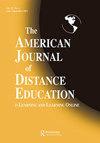媒介素养的电子学习策略:互动数字严肃游戏对理解视觉在线虚假信息的参与
IF 1.3
Q2 EDUCATION & EDUCATIONAL RESEARCH
引用次数: 0
摘要
本文章由计算机程序翻译,如有差异,请以英文原文为准。
E-Learning Strategies for Media Literacy: Engagement of Interactive Digital Serious Games for Understanding Visual Online Disinformation
ABSTRACT Digital interactive games are more than tools for entertainment and can be used as learning and training environments. This approach is giving rise to what is known as serious games. YouVerify! European project has developed a serious game called BotBusters to help young people cultivate the know-how to identify manipulated visual news. The game has been used as a distance learning tool in three different languages, French, Spanish and English, and has been applied to a large and open audience. Contributing to the literature body in the emerging field of online visual disinformation, this article aims to provide an analysis of the players’ behavior and to assess to what extent the game has been able to attract their attention and achieve the objectives of therefore mentioned distance training tool. A quantitative methodology based on in-game post-play data will be used to study game engagement rate evolution. A detailed study of the inoculative strategies of the game determined which ones were more useful to avoid the drop-out of the tool. The findings of this analysis determine that this gamified intervention keeps high the level of users’ engagement with the educational content and facilitate the inoculation of critical thinking to verify news and to avoid visual disinformation. Those findings will provide a better understanding of how young users reflect on media literacy and which is the best methodology to use on distance learning tools to motivate them to move from a simple opinion to constant and thorough verification.
求助全文
通过发布文献求助,成功后即可免费获取论文全文。
去求助
来源期刊

American Journal of Distance Education
EDUCATION & EDUCATIONAL RESEARCH-
CiteScore
7.20
自引率
3.10%
发文量
30
 求助内容:
求助内容: 应助结果提醒方式:
应助结果提醒方式:


